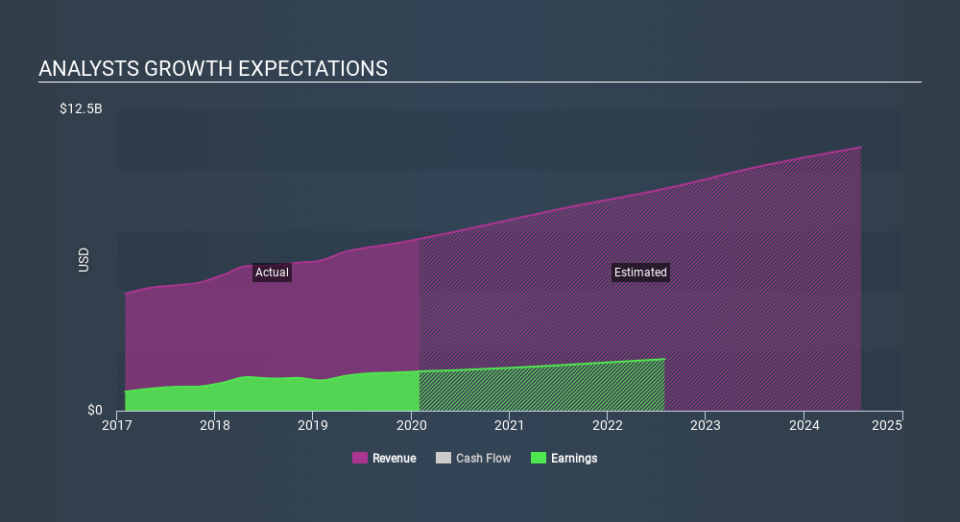Intuit Inc. Just Recorded A 29% EPS Beat: Here's What Analysts Are Forecasting Next

Last week, you might have seen that Intuit Inc. (NASDAQ:INTU) released its second-quarter result to the market. The early response was not positive, with shares down 6.8% to US$285 in the past week. Revenues were US$1.7b, approximately in line with what analysts expected, although statutory earnings per share (EPS) crushed expectations, coming in at US$0.91, an impressive 29% ahead of estimates. Earnings are an important time for investors, as they can track a company's performance, look at what top analysts are forecasting for next year, and see if there's been a change in sentiment towards the company. So we gathered the latest post-earnings forecasts to see what analysts' statutory forecasts suggest is in store for next year.
Check out our latest analysis for Intuit
Following the latest results, Intuit's 19 analysts are now forecasting revenues of US$7.54b in 2020. This would be a satisfactory 5.8% improvement in sales compared to the last 12 months. Statutory earnings per share are expected to rise 3.2% to US$6.46. In the lead-up to this report, analysts had been modelling revenues of US$7.53b and earnings per share (EPS) of US$6.44 in 2020. So it's pretty clear that, although analysts have updated their estimates, there's been no major change in expectations for the business following the latest results.
Analysts reconfirmed their price target of US$301, showing that the business is executing well and in line with expectations. The consensus price target just an average of individual analyst targets, so - considering that the price target changed, it would be handy to see how wide the range of underlying estimates is. The most optimistic Intuit analyst has a price target of US$345 per share, while the most pessimistic values it at US$210. As you can see, analysts are not all in agreement on the stock's future, but the range of estimates is still reasonably narrow, which could suggest that the outcome is not totally unpredictable.
Further, we can compare these estimates to past performance, and see how Intuit forecasts compare to the wider market's forecast performance. We would highlight that Intuit's revenue growth is expected to slow, with forecast 5.8% increase next year well below the historical 12%p.a. growth over the last five years. Compare this against other companies (with analyst forecasts) in the market, which are in aggregate expected to see revenue growth of 12% next year. Factoring in the forecast slowdown in growth, it seems obvious that analysts still expect Intuit to grow slower than the wider market.
The Bottom Line
The most obvious conclusion from these results is that there's been no major change in the business' prospects in recent times, with analysts holding earnings per share steady, in line with previous estimates. On the plus side, there were no major changes to revenue estimates; although analyst forecasts imply revenues will perform worse than the wider market. There was no real change to the consensus price target, suggesting that the intrinsic value of the business has not undergone any major changes with the latest estimates.
Still, the long-term prospects of the business are much more relevant than next year's earnings. We have estimates - from multiple Intuit analysts - going out to 2024, and you can see them free on our platform here.
We also provide an overview of the Intuit Board and CEO remuneration and length of tenure at the company, and whether insiders have been buying the stock, here.
If you spot an error that warrants correction, please contact the editor at editorial-team@simplywallst.com. This article by Simply Wall St is general in nature. It does not constitute a recommendation to buy or sell any stock, and does not take account of your objectives, or your financial situation. Simply Wall St has no position in the stocks mentioned.
We aim to bring you long-term focused research analysis driven by fundamental data. Note that our analysis may not factor in the latest price-sensitive company announcements or qualitative material. Thank you for reading.

